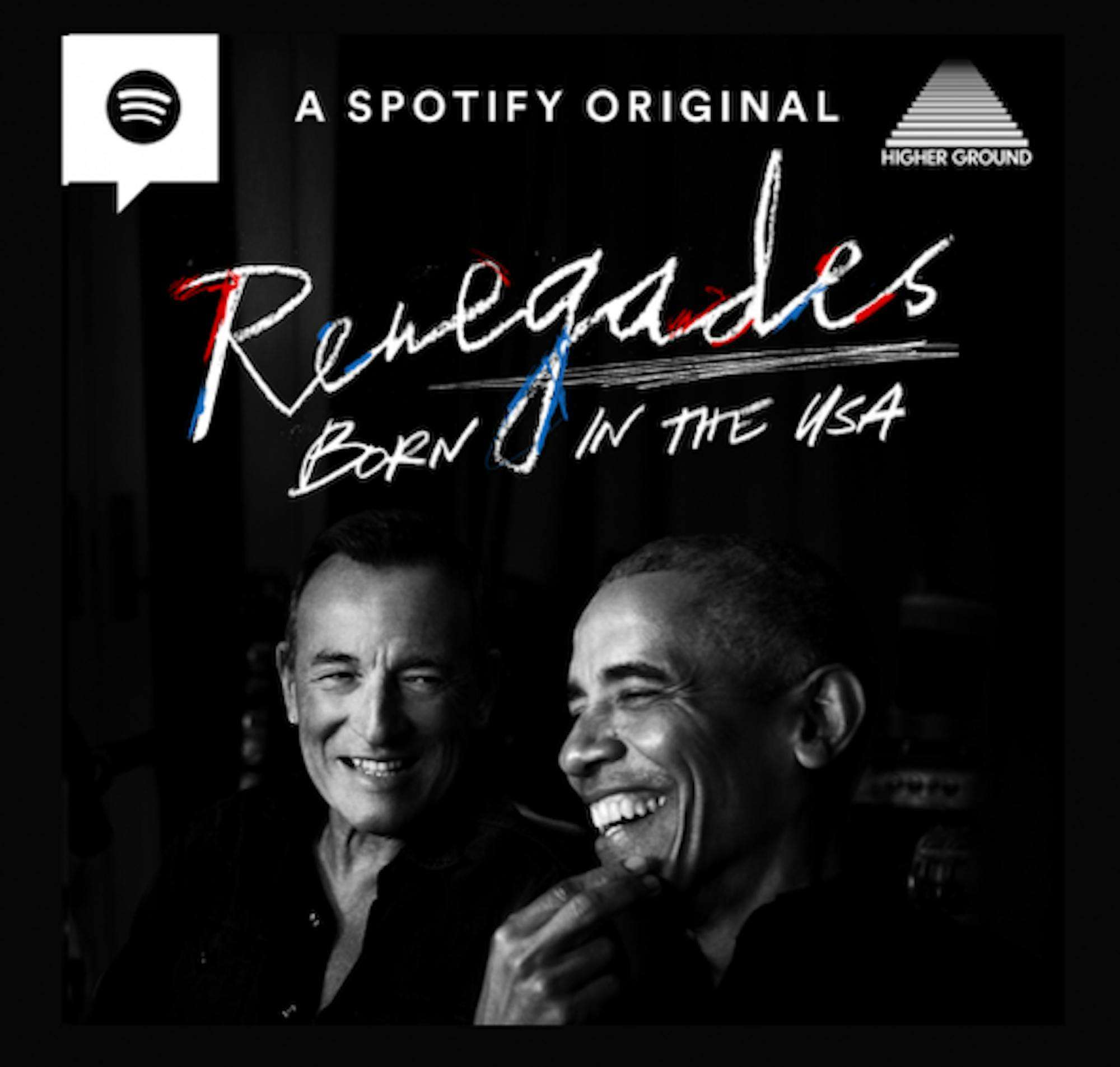In their latest pandemic ventures, former President Barack Obama and rock star Bruce Springsteen commandeered the podcast space, sitting down for “Renegades: Born in the USA” (2021) to unpack their shared understanding of family, work, race and America itself.
The eight-episode series, which debuted on streaming services on Feb. 22 and has released weekly episodes since, follows their upbringings, personal lives and careers in an ultimately successful attempt to humanize the two figures and craft a unifying American story from which its listeners might take inspiration.
Their chemistry is palpable throughout each episode, giving readers an exclusive look into their off-camera personas. The duo provides insight into the present condition of the country, assessing how it came to be so divided, a prescription that Obama makes in the series’ minute-and-a-half teaser. The podcast, in its high-quality production and editing, cultivates a somewhat cinematic ambiance, and listeners can almost see the wood-paneled, rustic framework of Springsteen’s home studio where the two are seated and hear the clinking of whiskey glasses set off to the side as the conversation naturally unwinds.
Interspersed with snippets of Springsteen’s songs, the first two episodes, “Our Unlikely Friendship” and “American Skin: Race in the United States,” chronicle the two men’s respective personal and professional developments and kickstart hard conversations surrounding systemic racism in the United States, successfully striking a balance between looking back and looking forward.
Obama discusses the racism and struggles he experienced growing up in Hawaii and the effects that race played in his conceptions of self and feeling like an outsider throughout his early life and career. Springsteen follows suit, talking about how race manifested in his hometown of Freehold, NJ and the eventual eruption of race riots there during the Civil Rights Movement.
Fans of Springsteen will recognize this anecdote from his song “My Hometown" (1984), in which he croons and references this same experience. It plays in the background as Springsteen talks, its melody taking on new meaning as he describes the event that inspired it.
The second episode of the podcast, “American Skin: Race in the United States,”begins with somewhat of a disclaimer and diagnosis by the former president.
“We know that bridging America’s racial divide is going to require concrete policies to address the ongoing legacy of slavery and Jim Crow, but, it also requires each of us,” Obama said. “In our workplaces, in our politics, in our places of worship and in a million daily interactions to make more of an effort to understand each other’s realities, not to mention our own unspoken attitudes.”
The conversation moves to Clarence Clemons, the saxophonist and only Black member of Springsteen’s E Street Band since 1974. Theirs was a lifelong friendship that made the difficulties Black Americans face more visible to Springsteen.
Springsteen struggles, at times, to talk about this relationship and the racial differences between himself and his late friend. Hearing the stuttering and hints of uncertainty take the place of his usually self-assured and wise rhetoric, however, creates some of the most valuable conversations of the first two episodes.
“How do you hold the same country that sent man to the moon with being the same country of Jim Crow?”Springsteen asked the former president.
Obama attributes it to a reckoning — one of America’s intensely divided racial past (and present) — that never came.He discusses the generational effect of systemic oppression, diving back into his presidency to explain that he had evaluated a concrete reparations program as politically unattainable during his two terms.
“The politics of white resistance and resentment … the talk of the ‘undeserving poor’ and the backlash against affirmative action … all that made … any coherent, meaningful reparations program … a non-starter,” he said.
While much of the podcast sees Obama removed from his former role as president, this is a rare moment that could have also occurred during a debate or press briefing in 2015.
The podcast’s seventh episode, "Fatherhood,”which was released on March 29, sees the two men redefining what it means to “be a man.”They discuss how their hectic schedules, as a politician and musician, respectively, forced them to prioritize family time and reevaluate their own lifestyles and choices to reconcile career and family.
The sheer love that these two men have for their families shines through in this episode. It’s a purely autobiographical installment, but one that necessarily humanizes them and adds to the balanced image of personability and intentionality.
The real shining stars of the series, though, are simply the voices of Obama and Springsteen, and their acute ability to tell a story. Obama’s deep and thoughtful tone and Springsteen’s rasp and ruggedness create a soundscape that is somewhat lulling, yet imbued with intention and intelligence.
If you understand what “Renegades: Born in the USA” was meant to do — center Obama and Springsteen as the stars of the show and discuss topics as they relate to them and their own lives — the podcast does a commendable job. The highlights come in moments that reveal vulnerability and discuss weighty subject matters, and are bolstered further by the casual, yet intensely thoughtful tone of the two throughout the series.






